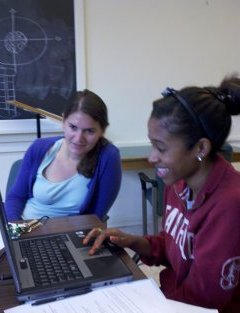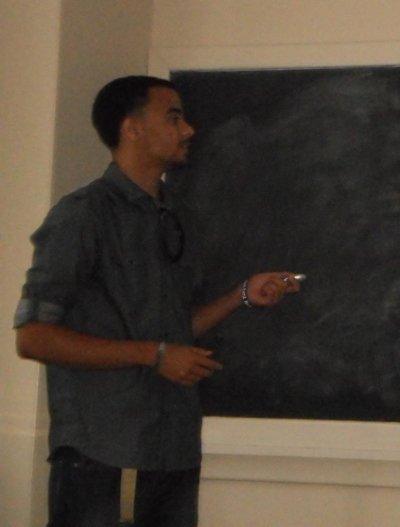SMART Workshop
SMART: Learning to Ask Questions

Program assistant Kathleen Eckert works alongside a SMART student participant.
The Summer Mentoring and Research Training (SMART) workshop is a one week program for teacher-student pairs to learn how to ask and answer questions using real astrophysical data. The SMART program is based on the guiding principles of Bloom's Taxonomy, which is a framework for building knowledge by asking questions at different levels of complexity. Throughout the week, we follow the levels of Bloom's Taxonomy, starting with remembering astronomy concepts from the eight modules in the prerequisite curriculum, progressing to analyzing and understanding new concepts, and ending with designing and completing small research projects. Teacher-student pairs work together throughout the week. At the beginning, UNC researchers mentor the pairs in data analysis techniques and scientific problem solving. As the week progresses, teachers transition to a guided mentoring role, helping students develop and complete research projects while UNC researchers play a consulting role. The week also includes opportunities for students to tour the Morehead Science Center and SOAR Telescope Remote Observing Center, meet undergraduates doing scientific research at UNC, and present talks on their own research projects for SMART.
What You'll Take Home from SMART
- Teachers
- Free Resources: The astronomical data sets and free Scilab software used during the SMART workshop can be used for short in-class activities, science fair projects, and everything in between. These resources can be used with any operating system.
- Technical Skills: The SMART program provides essential basic training in computer programming and data analysis skills, assuming no background beyond completion of our Scilab tutorial.
- Advising Know-How: Teachers will practice designing data analysis questions appropriate to different levels of student inquiry and will gain direct experience mentoring student research during the week, with UNC researchers on hand to help.
- Professional Development Credit: A certificate of completion will be provided at the end of the SMART workshop, enabling participants to receive up to 6 CEUs of professional development credit.
- Students
- Programming Experience: The free data analysis and coding environment Scilab offers an ideal learning environment for beginning programmers; its multi-purpose capabilities can be adapted to future senior-year or college projects in any technical field.
- Data Analysis Skills: Students will gain experience with common data analysis techniques and explore issues such as selection bias that affect the reliability of conclusions.
- College Readiness: The SMART program focuses on developing the analytic and creative thinking skills required to ask and answer research questions, giving students a head start on success in college.
- Presentation Skills: Students will be introduced to best practices for creating outstanding oral presentations and will present final talks on their own research with help from their partner teachers.
- New Perspective: After a week of hands-on learning in astronomy, interaction with active researchers, and visits to UNC science facilities, students will have discovered firsthand that the Universe is not only vast and amazing, but also fun to explore!

A KIPP Pride High School student from Gaston, North Carolina presents his research.
Eligibility and Prerequisites
SMART is looking for teacher-student pairs from public schools*, especially in North Carolina. Out-of-state teachers may apply separately and be paired with local students from KIPP Pride High School in Gaston, NC. In order to apply, teachers must teach high school physics and students must have taken a physics course. In addition, both students and teachers must have completed Modules 1-8 in our short AIMs curriculum, a set of astronomy lessons aligned to the North Carolina state high school physics standards. Upon selection, student and teachers will be asked to complete our Scilab tutorial prior to the SMART week.
*Private school participants are welcome if extra slots are available, but only public school participants can be subsidized with SMART program funds.
Logistics
The 2013 SMART program will take place in June or July (dates TBD), starting and ending on two Saturdays one week apart at 2pm.
Costs of travel are subsidized for participants from public schools: hotel rooms near the UNC campus are direct billed to the program and a $300 stipend is provided to offset other expenses (meals, travel, etc.). Students may also apply for scholarship funds to offset any financial loss due to missing work time at a paying job to attend the SMART program. There is no fee for the SMART workshop itself.
Teachers are expected to make travel arrangements to Chapel Hill for both themselves and their students. The hotel used by the SMART program offers a free shuttle, which will transport teachers and students between the hotel and the UNC Department of Physics and Astronomy each day.
Laptops are required for participation in this program and should be supplied by the participants and/or their home high schools. Upon acceptance to the program, both teachers and students will need to download Scilab onto the laptops they will use during the SMART week, as described in the Scilab tutorial, and complete the tutorial.
To apply for the SMART program, please click here to download the application form. Students should fill out Section I, then teachers should fill out Section II and submit the form. If you apply before the program dates are set, please indicate any June-July preferences or conflicts. Applications may be submitted either as scanned pdf files sent to smartprogram@unc.edu or as hardcopy sent to Prof. Sheila Kannappan, Dept. of Physics & Astronomy, 290 Phillips Hall CB3255, University of North Carolina, Chapel Hill, NC, 27599. The deadline is April 23, 2013.